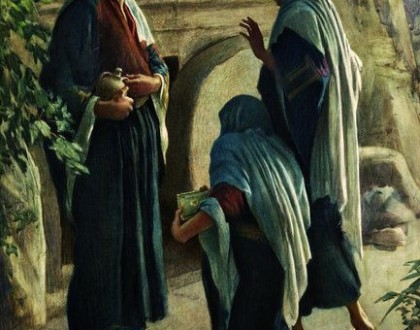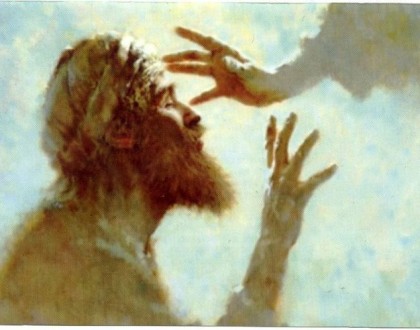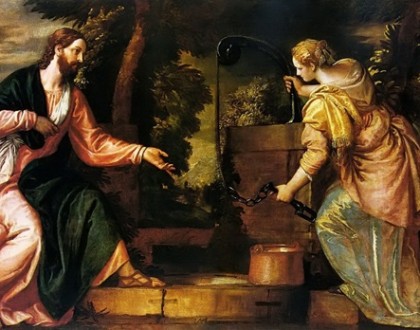Second Sunday in Ordinary Time, Year B – January 18, 2015

Second Sunday in Ordinary Time, Year B – January 18, 2015
The Irresistible Call
This is a beautiful passage from Saint John. Jesus calls his first disciples. It is a beautiful and powerful scene. We enter into it with a great deal of pleasure.
We are essentially called beings, “he loved us first” as the first letter of Saint John reveals. What Matthew is showing us is what Jesus is essentially about; God coming to us to call us into Him.
Everything in our culture calls on us to be self reliant, in control, our own boss. Don`t let other people push you around. Be a leader not a follower. Assert yourself, freedom, freedom, over and over again our culture insists on that value. Set the tone for your own life. Go where you want to go. It’s deeply engrained in our culture.
When Saint Paul introduces himself at the beginning of each of his letters he says he is “called by God’s will to be an apostle”. Who is he? First and foremost he is someone who is “called”. He is not doing the calling. Someone has seized him and that defines who he is. Not his own will. “Paul called by God’s will”.
Keep in mind Jesus comes as the 2nd person of the Blessed Trinity, which means he comes as a representative of this divine communion, the Father, Son and Spirit. Jesus`s purpose is to bring this power of love and communion into this broken world. And so the act by which Jesus himself gathers people around himself is essential to his life and work. As the first disciples were drawn and called into his family, his communion, so are we. Maybe that’s why we find this passage so rich and satisfying.
In the book of Genesis we hear that in the cool of the evening, God would walk with Adam his creature. Now if you are a middle-eastern person, the cool of the evening, that’s the best time of the day. The sun is gone down and now the world is displayed at its very best and delightful. During that time Adam walks with God. What’s being signaled here is, that easy intimacy that God wants with us. After the original sin, after the eating of the fruit of the tree, Adam and Eve cover themselves up, they were ashamed. And then they hide in the underbrush of Eden. Genesis tells us that God came as usual in the cool of the evening, His stroll and conversation with his beloved creatures. And now he finds them, not ready and waiting, but he finds them, hiding, shamed, fearful. Right there is expressed all of the tragedy of sin. We have a God who wants to walk with us, in easy intimacy. But sin hasn’t sent God away; God still comes to walk with us. What sin has done is that it has forced us into hiding.

I am your God, I want you to be my people. I want a covenant of love with you. And what does sin do?
The Old Testament is the whole story of God hunting us down. Hoping once more to walk with us in the cool of the evening. As God sends his patriarchs, his prophets and his spokesmen. They always have one message; I am your God, I want you to be my people. I want a covenant of love with you. And what does sin do? It keeps driving us away into hiding.
Reflecting on today’s readings, especially the call of Samuel and of Andrew and his brother, I remembered something that the German Lutheran Pastor Dietrich Bonheoffer wrote from his prison in Nazi Germany, that “only by living unreservedly in this life’s duties, problems, successes and failures, experiences and perplexities … does one become a man and a Christian.” Bonheoffer experienced what he called so poignantly “the cost of discipleship.”
In the Gospel story this week it is Jesus who takes the initiative or the first step. His question to the disciples is intriguing: “What are you looking for?” (1:38). Far from any simple interrogation, these words are deeply religious and theological questions. “Why” Jesus asks, “are you turning to me for answers?”
They ask him, “Teacher, where do you live? Where do you stay?” (v. 38). The verb “live,” “stay,” “remain,” “abide,” “dwell,” “lodge,” occurs 40 times in the Fourth Gospel. It is a verb that expresses concisely John’s theology of the indwelling presence.
What can we learn from the call stories in today’s readings? We are never called for our own sake, but for the sake of others. Israel was called by God for the benefit of the godless around it. God calls all Christians for the sake of the world in which we live.
To be called does not require perfection on our behalf, only fidelity and holy listening. Samuel and the prophets of Israel, the fishermen of Galilee and even the tax collectors that Jesus called were certainly not called because of their qualifications or achievements. Paul says that Jesus calls “the foolish,” so that the wise will be shamed. It is a dynamic call that involves a total response on our part. We will never be the same because he has called us, loved us, changed us and made us into his image. Because he has called us, we have no choice but to call others to follow him.
Recent Sermons

Easter Sunday – The Resurrection
April 14, 2017

4th Sunday of Lent Year A – The Man Born Blind
March 27, 2017

3rd Sunday of Lent Year A – The Samaritan Woman at the Well
March 20, 2017

